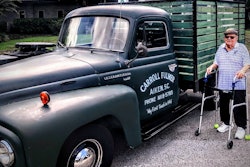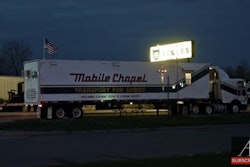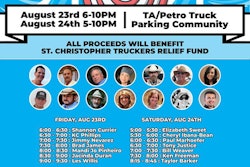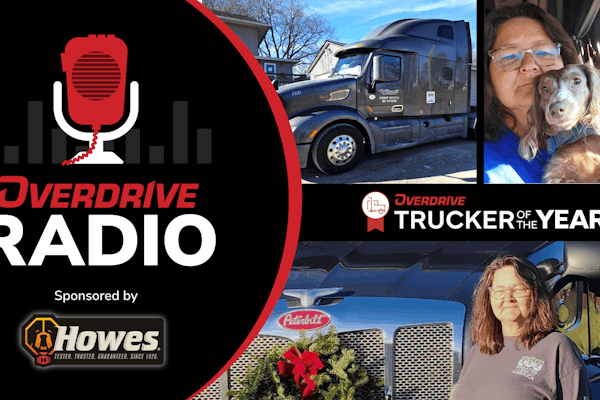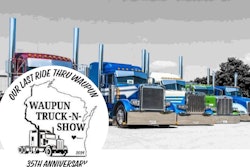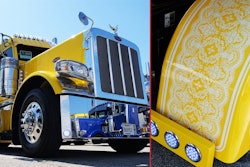I heard Hiram King Williams for the first time in the difficult Spring of 1987. His voice was calling through a tinny PA outside of a makeshift chapel at Truckers’ World, Shepherdsville, Kentucky. I was a struggling newbie with Builders Transport, over the road now for the first time. I’d left my local straight truck gig to chase the big money. It hadn’t worked out as planned. I was 28 years old with five mouths to feed and $7 cash on hand. All I had left for shoes were my old brown wing tips, worn down at the heel so badly they were hobbling me.
People steal, they cheat and lie, for wealth and what it will buy;
But don’t they know on the judgment day, that gold and silver will melt away?
I’d rather be in a deep dark grave and know that my first soul was saved
Than to live in this world in a house of gold, and deny my God and doom my soul.
I drew up close to the PA’s speaker and closed my eyes to hear better, as one who had just chanced upon his own biography. When the song ended, I opened my eyes. On the threshold of the crude sanctuary stood a man in a light blue shirt and grey polyester slacks, like a workingman in his best clothes.
“That’s Hank Williams,” he said, chuckling. “Chapel’s in fifteen minutes. We’d love to have ya.”
“You sing these kind of songs in there?” I asked.
“Sure do,” the chaplain said, walking back inside.
I listened. A different song, with different singers. Two with a soulful gravitas that easily rivaled Hank. The chaplain was back outside again, moving some things around.
God saw me, and he knew about my weakness,
And he knew that I was sinking deep in sin.
He heard my prayer, he saw the tears of all my loved ones.
God reached way below the bottom for me that night.`
“Now who’s this?” I said.
“The Stanley Brothers,” he said.
I’d had my fill of religion. There was the non-denominational church my wife and I had gotten hooked up with for a while. They did these improvisational jam sessions right in the middle of the service which could carry you away. I’d been welcomed in as the house harmonica player. But the preacher’s theology might be best described as “check your mind in at the door and trust me.”
I bought into all of it for a while. His whole “speak healing over sickness” thing reduced me to telling my dying father-in-law that everyone at church had prayed, and he was healed, and that was that. Still, my best intentions were no match for the 33 years of Kent 100s, Strohs longnecks and Kentucky bourbon that ol’ Harry “Bud” Gindhart had consumed copiously since the end of World War II. He was the truest friend I had ever known, and his final memories of me were my delusional proclamations of a miraculous recovery from the cancer which raged through his body.
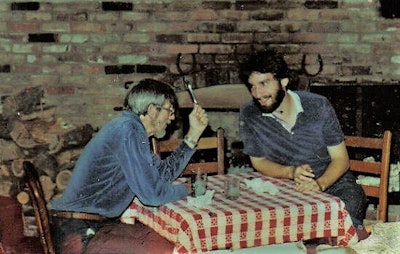 Harry “Bud” Gindhart (left) with a young “Long Haul Paul” Marhoefer
Harry “Bud” Gindhart (left) with a young “Long Haul Paul” MarhoeferThe miracle never came. In the years that followed, I had come to avoid those who spoke on behalf of the Almighty for the fool their kind had made of me.
Still, I trusted something in the voice of Hank Williams, and the voices of the Stanley Brothers. So I took a chance on the Kentucky chaplain.
The service commenced. He was true to his word, and a darn good flattop picker at that. It seemed I knew nearly every song he chose, and they were all in my key. About a dozen locals had come to join in at the truck stop chapel — a man in overalls, workers fresh off of their shift with their names on their shirts, middle-aged women with kind and weary eyes, farmers and farmers’ wives, the chaplain’s own wife. It seemed every one of them could sing, harmonizing beautifully in that little room.
Soon I was pouring my own pathos into those songs, like a man with nothing left to lose.
“Brother you can sing! ” the chaplain called out to me between hymns. “You a preacher?”
“No sir,” I answered.
The chaplain called out a hymn number. “When He Reached Down His Hand For Me.” We started in again. When the last words of the final chorus were over, the room fell silent. The chaplain just stood there now as congregants murmured or shouted “Hallelujah!”
“Thank you Lord”
“Hallelujah.”
He stepped out from behind his podium, walked up to me and handed me his guitar. “How bout playing us one, brother?”
It was the thing I’d most hoped for — and quite frankly dreaded. I hadn’t played much since those churchgoing days. Still, maybe I could bluff my way through “Amazing Grace” without my private war with God being made manifest.
As I sang, it all played itself out like a movie in my head. The well-meaning matron in the vestibule of that cinder-block church all those years ago: “It’s not your fault he passed. He just didn’t have the faith.” Felt like being told, “if your son hadn’t shown fear, my pit bull would never have mauled him.”
It all left me with no want of malice for church folk. And there was the matter of all the things that happen to love when the money runs out. How long would it be until I became the lowest common denominator among my peers, just another low-life boasting of every coital conquest from Barstow to Birmingham? I recalled my promise to my father-in-law that I would take care of his daughter. That wasn’t going so well. Yeah, there was plenty self-loathing.
I looked out at the hardscrabble faces of those people. They were listening earnestly to every word, and I was lying to them. I was lying to Hank Williams. I was lying to Ralph and Carter Stanley. I never made it through the second verse.
“I can’t do this,” I said. “I’m a lot of things but I’m not a hypocrite. Thing is, I ain’t right.”
I handed the chaplain back his guitar.
“Would you like to talk to God about it?” he said.
So I gave my heart to Jesus that night; and I gave my heart to Hank Williams; and I gave my heart to Ralph and Carter Stanley. When it was over, all those kind people walked up to me one by one and shook my hand to complete the induction. Then the chaplain walked up with a boot box: “Would these fit you? Somebody donated them last week.” I opened it to find a pair of those Durango side-zip western style boots, the exact kind my father-in-law wore. They fit like a glove.
“I suppose you’ll be wanting this too,” he said. It was the cassette he had compiled himself with all those Hank Williams and Stanley Brothers songs. I thanked him profusely for this. We said our goodbyes and I walked back to my truck, hobbled no more.
It is difficult to overstate how precious that collection of songs were. In an age where even the most obscure artists are just a few clicks away, songs like Williams’ “House of Gold” or the Stanley Brothers’ “Coming Home” weren’t something you could find at any record shop I knew of. I must have played that tape a thousand times before it finally gave out. In the process, everything I ever thought a song should be was turned on its head. Out with the boy-meets-girl drivel. Let’s have a conversation about death, prodigality, sin, redemption.
Not long after that memorable evening the old Truckers’ World in Shepherdsville was torn down and a hotel built in its place. For some reason, the removal of the old chapel, which stood on the grounds’ periphery in plain view of I-65, was not a matter of much priority to the new occupants. Long after my Durango side-zip boots were spent, and the homemade Hank Williams cassette finally worn clear through, the makeshift sanctuary stood defiantly, reliefed now by the new hotel and its manicured grounds.
It didn’t take long for briars and brambles to burst forth through its threshold; vines clung to its walls, as if coaxing it back to the earth. By the time I was learning the finer points of working a log book, and how to not go around with $7 to my name, its roof was beginning to cave, giving the forsaken sanctuary a piteous look. Still, it held on for a while longer. Denise bore our fourth child, and we named her Audrey.
One day with a load of dry freight headed for Mobile, I looked for the chapel once more, and there was just was just a vague rectangle of fresh dirt where the band of the broken had once shouted and sang.
I wish I could tell you that I got right that night, stayed right, and lived happily ever after; but it didn’t quite work out that way. If you don’t believe me just ask Bud’s daughter. Still, a stranger had given me something I was clean out of that night — trust. All I could give him in return was my own truth, the unwillingness to defraud him. In the transaction, by God’s grace, I found a way not to hate anymore. I never saw those people ever again.
There’s nothing left now of the old Truckers’ World or its makeshift chapel but a song I wrote about it called “The Old Cumberland.” If you’re not doing anything on Thursday, August 22, swing by The Great American Truck Show in Dallas. I’ll be singing that one and others at the TA/Petro Parking Community stage. Denise and I will be celebrating our 38th wedding anniversary that very evening, and I will be turning 60 that day. Till then, have fun on your run.
An early version of this story called Truckers’ World the “Truckers’ Inn.” A basic error of memory, after many many years, says Long Haul Paul. Thanks to the reader who corrected it. We regret the error.


